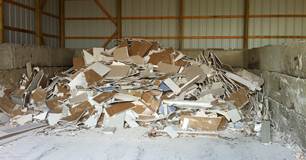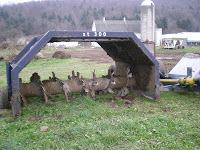Steps toward Zero Waste for Contractors and Builders, Part 2
This article continues our blog series on laying out a "roadmap" for builders and contractors on moving towards zero waste for construction and demolition projects. Zero waste is a path that can lead to savings and profit. Zero waste does not actually mean "zero waste," as some think. Instead it is a goal and en route to that goal, great change and value can be achieved. And, contractors can realize cost reductions by following this path. Zero waste in construction and remodeling projects focuses on looking for opportunities:
- Generating less waste by using materials more efficiently – saves money;
- Reusing materials on site, or selling or donating them to someone else for reuse – cost containment, potential revenues or tax benefits; and
- Recycling whenever possible – might save you money and could even bring in revenue.
Zero waste in construction and remodeling is a win-win proposition, and not as hard to do as you might think.
Materials to be Reused & Recycled
The Plan should list the specific materials that you intend to reuse or recycle. The first step is to understand which materials have reuse…
Drywall - the Recycling Option
 It can be tough to divert construction and demolition materials for recycling, especially in small towns and rural areas. Chittenden Solid Waste District is paving the way for Vermont communities with its new Drywall Recycling Program.
It can be tough to divert construction and demolition materials for recycling, especially in small towns and rural areas. Chittenden Solid Waste District is paving the way for Vermont communities with its new Drywall Recycling Program.
In summer 2012, Vermont's Chittenden Solid Waste District launched a long-awaited recycling program for clean, new gypsum drywall. "We'd been talking about it for years," reports Nancy Plunkett, CSWD's Waste Reduction Manger, "but the transportation and tip fees for the nearest markets exceeded landfill disposal costs. There would be no incentive for most contractors to keep the material separate."
When CSWD managers were writing the District's Five Year Work Plan in 2008, they saw increased demand for C&D recycling programs,…
Farm Compost Marketing Insights
Effective marketing can influence whether a company survives in today's economy or not. This is true in any business, including compost. Compost operations must compete with other compost operations, as well as gardening supply centers and retail stores selling multiple brands of compost, peat moss, and fertilizers.
To expand and support compost markets in the Northeast, NERC was awarded a grant from the Northeast Sustainable Agriculture Research and Education (SARE) program. Resources developed by NERC for the project, as well as presentations from seven compost marketing workshops, are posted on NERC's Compost Marketing webpage.
NERC is also providing technical assistance to farm compost operations. NERC developed operation-specific marketing plans and provides ongoing advice to compost operators. Recent site visits were made to three farm compost operations in New York State.
Building with Steel on the Path town Zero Waste C&D
Additional thoughts on Steps Toward Zero Waste for Contractors and Builders from Chip Foley with the Steel Recycling Institute.
Use of steel studs and beams in the building of an average home—as opposed to wood—results on average of about a bushel basket of steel cut ends, cut-outs and other scrap. Steel scrap is easily recycled and can often be sold to the local scrap dealer. In contrast, building with wood studs and beams can generate up to a dumpster full of waste, which may have limited recyclability, depending on local markets.
Steps Toward Zero Waste for Contractors and Builders
In previous blog articles we offered some C&D Recycling Insights. NERC's new Moving towards Zero Waste & Cost Savings – A Roadmap for Builders & Contractors for Construction & Demolition Projects takes it a step further to offer a roadmap toward "zero waste."
Zero waste is a path that can lead to savings and profit. Zero waste does not actually mean "zero waste," as some think. Instead it is a goal and en route to that goal, great change and value can be achieved. And, contractors can realize cost reductions by following this path. Zero waste in construction and remodeling projects focuses on looking for opportunities:
- Generating less waste by using materials more efficiently – saves money;
- Reusing materials on site, or selling or donating them to someone else for reuse – cost containment, potential revenues or tax benefits; and
- Recycling whenever possible – might save you money and could even…


